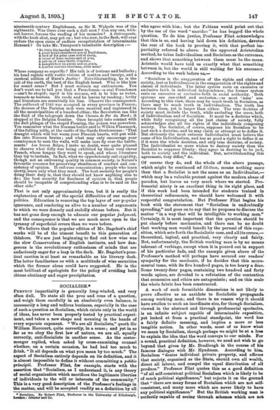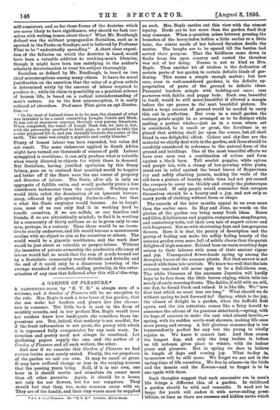SOCIALISM.*
PERFECT impartiality is generally long-winded, and very often dull. To state all the pros and cons of a question, and weigh them carefully in an absolutely even balance, is necessarily a long and tedious business, especially in the case of such a question as Socialism, which exists only in the world of ideas, has never been properly tested by practical experi- ment, and takes a new shape and meaning in the hands of every separate exponent. "We are all Socialists," quoth Sir William Harcourt, quite correctly, in a sense ; and yet in so 2ar as we obey the first law of nature, we are all, equally correctly, anti-Socialists in another sense. As the costar- monger replied, when asked by cross-examining counsel whether, on a certain occasion, he had had too much to drink, "It all depends on what you mean by too much." The aspect of Socialism entirely depends on its definition, and it is almost impossible to define it without committing a petitio principii. Professor Flint, for example, starts with the assertion that "Socialism, as I understand it, is any theory of social organisation which sacrifices the legitimate liberties of individuals to the will or interests of the community." This is a very good description of the Professor's feelings in the matter, and will be accepted readily as a definition by all • Socialism. By Robert Flint, Professor in the University of Edinburgh. London : Isbis' ter and Co.
who agree with him ; but the Fabians would point out that by the use of the word " sacrifice " he has begged the whole question. To do him justice, Professor Flint acknowledges that this is so, and having laid down his definition, devotes the rest of the book to proving it, with that perfect im- partiality referred to above. In the approved Aristotelian method, he takes Individualism and Socialism as the extremes,
and shows that something between them must be the mean. Aristotle would have told us exactly what that something
between is, but the world is still waiting for his successor. According to the work before us,—
" Socialism is the exaggeration of the rights and claims of society, just as Individualism is the exaggeration of the rights and claims of individuals. The latter system rests on excessive or exclusive faith in individual independence ; the former system rests on excessive or exclusive faith in social authority. Both systems are one-sided and sectarian,—as most 'jams' are. According to this view, there may be much truth in Socialism, as there may be much truth in Individualism. The truth lies between them, yet is larger than either. The true doctrine of society must include the truth, while excluding the error, both of Individualism and of Socialism. It must be a doctrine which, while fully recognising all the just claims of society, fully acknowledges also all the rights of the individuals composing society. The Socialist, of course, supposes his Socialism to be just such a doctrine, and he may claim or attempt so to define it. But obviously the most extreme Individualist must believe the same of his Individualism, and has as good a right to define it as if it were the whole doctrine, and only true doctrine, of society. The Individualist no more wishes to destroy society than the Socialist to suppress liberty : they agree in desiring to be just, both to society and the individual. But, notwithstanding this agreement, they differ," &c.
Of coarse they do, and the whole of the above passage, which might be continued ad libitum, means nothing more than that a Socialist is not the same as an Individualist,—
which may be a valuable protest against the modern abuse of paradox, but leaves us very much where we started. Pro- fessorial nicety is an excellent thing in its right place, and if this work had been intended for students trained in theoretical refinements, we should have welcomed it with respectful congratulation. But Professor Flint begins his book with the statement that "Socialism is undoubtedly spreading," and goes on to say that he proposes to discuss the matter "in a way that will be intelligible to working men."
Certainly, it is most important that the question should be put clearly before mechanics, and there can be no doubt that working men would benefit by the perusal of this expo- sition, which sets forth the Socialistic case, and all its errors,— theoretical, logical, and practical, very clearly and fairly.
But, unfortunately, the British working man is by no means tolerant of verbiage, except when it is poured out in support of his particular fads, and the example given above of the Professor's method will perhaps have secured our readers' sympathy for the mechanic, if he decides that this monu- mental tome, with its five hundred pages, is too heavy a dOse. Some twenty-four pages, containing two hundred and forty words apiece, are devoted to a refutation of the contention that economics and ethics are antagonistic; and on this scale the whole fabric has been constructed.
A work of such formidable dimensions is not likely to prove effective as an antidote to Socialistic propaganda among working men; and there is no reason why it should have swollen to such an inordinate size, for though Socialism, viewed in the abstract and through professorial spectacles, is an infinite subject capable of interminable exposition,
yet looked at from a practical standpoint, the word has a fairly definite meaning, and implies a more or leas tangible notion. In other words, most of us know what we mean by Socialism, though perhaps we might be at a loss
to explain the idea that the word conveys to our minds. For a sound, practical definition, however, we need not wish to go beyond that given by Mr. Bradlaugh in the course of his
famous dialogue with Mr. Hyndman. According to him, Socialism "denies individual private property, and affirms
that society, organised as the State, should own all wealth, direct all labour, and compel the equal distribution of all
produce." Professor Flint quotes this as a good definition "of all self-consistent political Socialism which is likely to be of much political significance," but rejects it on the ground that "there are many forms of Socialism which are not self- consistent, and many more which are never likely to have any political significance?' But the British working man is I perfectly capable of seeing through schemes which are not
self-consistent, and as for those forms of the doctrine which are never likely to have significance, why should we fash our- selves with writing tomes about them ? What Mr. Bradlaugh defined was the militant propagandist Socialism, such as is spouted in the Parks on Sundays, and is believed by Professor Flint to be "undoubtedly spreading." A short clear exposi- tion of the fallacies on which the doctrine is based, would liave been a valuable addition to working-men's libraries, though it might have been less satisfying to the author's scholarly determination to treat his subject thoroughly. Socialism as defined by Mr. Bradlaugb, is based on two chief misconceptions among many others. It bases its moral justification on the assertion that the value of a given article is determined solely by the amount of labour required to produce it ; while its claim to possibility as a practical scheme of human life, is based on a radical misunderstanding of man's nature. As to the first misconception, it is easily reduced ad absurdum. Prof essor Flint gives an apt illustra- tion :—
"In the west of Ireland there is to be seen the channel of what was intended to be a canal connecting Loughs Corrib and Mask. It was cut at enormous expense through very porous limestone. When completed, the water of Lough Mask was let into it, but, with the perversity ascribed to Irish pigs, it refused to take the course prepared for it, and ran straight towards the centre of the earth. The canal was simply a gigantic and costly blunder."
Plenty of honest labour was here expended, but value did not result. The same endeavour applied in South Africa might have turned out thousands of ounces of gold. Labour misapplied is worthless ; it can only produce what is valuable when wisely directed to objects for which there is demand, But Socialism, having justified spoliation by this flimsy fallacy, goes on to contend that mankind would be happier and better off if the State were the one owner of property and director of labour. The State, after all, is only an aggregate of fallible units, and would probably prove a less considerate taskmaster than the capitalist. Working men would little relish the domination of an ignorant bureau. racy, officered by glib-speaking Jacks-in-office ; but that is what the State employer would become. As to happi- ness, most of us can only find it in working hard to benefit ourselves, if we are selfish, or our families and friends, if we are altruistically minded ; to find it in working for a community of thirty millions or so is given only to one man, perhaps, in a century. Thus there would be no incen- tive to sturdy endeavour, and life would become a monotonous routine with no object to aim at for ourselves or others. The world would be a gigantic workhouse, and the work done would be just about as valuable as pauper-labour. Without the incentive of private ownership the productive efficiency of tabour would fall so much that the sum of goods turned out by a Socialistic community would dwindle and dwindle, and the end of it could only be a disastrous lowering of the average standard of comfort, ending, probably, in the exter- mination of any race that followed after this will-o'-the-wisp.



































 Previous page
Previous page